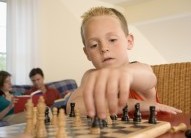OUR PHILOSOPHY & METHODOLOGY
Click tabs for more info… Language Transit believes that true learning and intelligence comes when children are able to think critically, understand concepts, and figure out new problems on their own. While there are some very positive aspects of memorization, we feel that this type of learning should only be used as a tool and is not a good foundation for a teaching methodology. Rote learning can be a good way for a child to learn their times tables or memorize certain facts for a test and can often bring about quick results. Memorization, or commonly called cramming or the “drill and fill” method of learning, is a good way to expose young, beginning learners to vast amounts of basic information necessary as building blocks for education. This is how we learn the alphabet. It is also great for test takers and is one of many academic tools we may implement in our test preparation programs. There is the old adage, “practice makes perfect,” and this is often the thought behind rote learning. However, once a child is beyond kindergarten or early grade school, what does it mean to truly educate a child? At some point, we all question what is more important for our children, grades or true learning. We definitely want your child to excel academically but what makes a great leader, thinker, world changer, innovator, or even just a well adjusted individual? What worked or is working for you may not be what works for our children. The world is changing rapidly and no one knows what the future will look like. The important question we may want to ask ourselves as parents is what life skills, in addition to academics can we give our children to help them navigate an uncertain, yet exciting future. The same goes for learning science, mathematics, geography, or even English. Students are often At Language Transit, we want to give your child access to all types of learning methods and tools so that they can fill their intellectual toolbox with It’s not just our philosophy and methods that makes Language Transit different. The real difference is evident on the faces of the students that attend our after school education center. Our program is designed to engage our students, it is intended to make children want to learn. Children don’t need to The mind is not a vessel to be filled, but a fire to be kindled. -Plutarch
required to memorize hundreds of different body parts for anatomy or biology but retain very little information. True learning and memory retention comes when students learn how these body parts are connected and what function they serve as a whole in their own bodies. This is contextualized learning: it is a method where students are taught difficult concepts in a context that relates to the world around them. It is learning that is relevant to their current paradigms and to their understanding of the world. This type of learning is different than memorization in that it brings the fun back into learning, because it is dynamic and every new skill or fact they learn is immediately applied for them to see it in action. This is why Language Transit chooses to teach grammar in the context of writing, for example, rather than simply just drilling your child with endless pages of worksheets full of grammar do’s and don’ts. We are confident that there is no better way to learn grammar than while using it. This is the idea of learning to apply learned knowledge, and is the basis of critical thinking.
Do not train a child to learn by force or harshness; but direct them to it by what amuses their minds, so that you may be better able to discover with accuracy the peculiar bent of the genius of each. -Plato
walk out of a program with their heads down, having climbed an endless mountain of drills and cram-work. No one can force a person to learn. We understand that children have a finite attention span, we know they all learn differently, we understand their needs, so we give them what they need. It is the idea of planting a tree in fertile ground. Language Transit creates and nurtures an atmosphere of discovery, where a student can feel the fun and excitement of learning, the sheer delight of discovery, or the thrill of solving a problem. It is learning, then application, then seeing the results, tweaking it, making it better, digging, seeking, exploring, and creating…it is active learning. Our program is about pushing the boundaries of their understanding and urging your child to go farther, push harder, jump higher, and dream bigger. We have the recipe to make learning fun!







